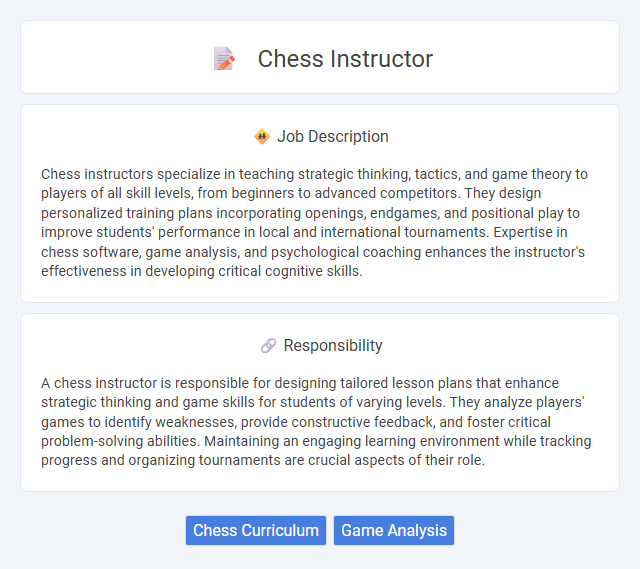
Chess instructors specialize in teaching strategic thinking, tactics, and game theory to players of all skill levels, from beginners to advanced competitors. They design personalized training plans incorporating openings, endgames, and positional play to improve students' performance in local and international tournaments. Expertise in chess software, game analysis, and psychological coaching enhances the instructor's effectiveness in developing critical cognitive skills.
Individuals with strong analytical skills and patience are likely to be well-suited for a chess instructor job, as it requires explaining complex strategies in a clear and engaging manner. People who enjoy teaching and have a genuine interest in chess probably find this role rewarding and fulfilling. Those who prefer dynamic, fast-paced environments or lack patience may find the job less suitable.
Qualification
A qualified chess instructor must possess in-depth knowledge of chess strategies, openings, midgame tactics, and endgame techniques. Proven experience in coaching players of various skill levels, from beginners to advanced competitors, enhances instructional effectiveness. Certification from recognized chess organizations, such as FIDE or US Chess Federation, and strong communication skills are essential for successful teaching and student engagement.
Responsibility
A chess instructor is responsible for designing tailored lesson plans that enhance strategic thinking and game skills for students of varying levels. They analyze players' games to identify weaknesses, provide constructive feedback, and foster critical problem-solving abilities. Maintaining an engaging learning environment while tracking progress and organizing tournaments are crucial aspects of their role.
Benefit
Working as a chess instructor likely offers the benefit of developing critical thinking and strategic skills both for the instructor and their students. It probably provides the opportunity to foster a stimulating learning environment that encourages intellectual growth and patience. This role may also deliver a sense of fulfillment from mentoring players and witnessing their progress in the complex game of chess.
Challenge
A chess instructor likely faces the challenge of tailoring lessons to varied skill levels while maintaining student engagement. Balancing the complexity of strategies with accessible teaching methods may prove difficult, especially for younger or novice players. Effective communication and adaptability probably become essential in overcoming these instructional obstacles.
Career Advancement
Chess instructor positions offer a strategic pathway for career advancement through skill enhancement and certification in teaching methodologies. Proficiency in advanced chess strategies, tournament organization, and student mentorship can lead to roles such as head coach, chess program director, or educational consultant. Continuous professional development and networking within chess federations significantly increase opportunities for leadership positions and international coaching assignments.
Key Terms
Chess Curriculum
A Chess instructor designs a comprehensive chess curriculum that develops critical thinking, strategic planning, and problem-solving skills. The curriculum includes lessons on openings, middle-game tactics, endgame strategies, and chess notation to enhance players' understanding and performance. Structured training programs and practice exercises are tailored to various skill levels, from beginners to advanced players.
Game Analysis
Chess instructors specializing in game analysis provide players with detailed evaluations of their matches, identifying strengths, weaknesses, and pivotal moments. Utilizing advanced software and strategic frameworks, they offer tailored feedback to improve decision-making and tactical skills. This role demands expertise in position assessment, opening theory, and endgame techniques to enhance a player's overall performance.
 kuljobs.com
kuljobs.com